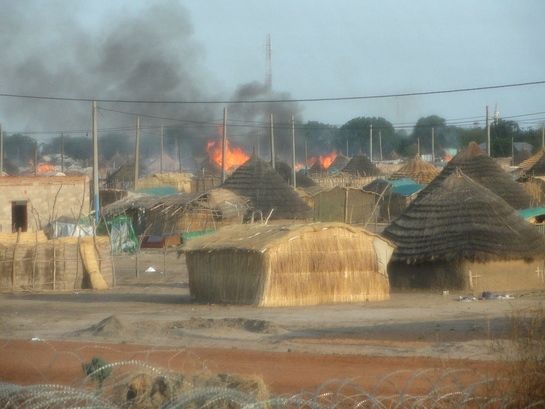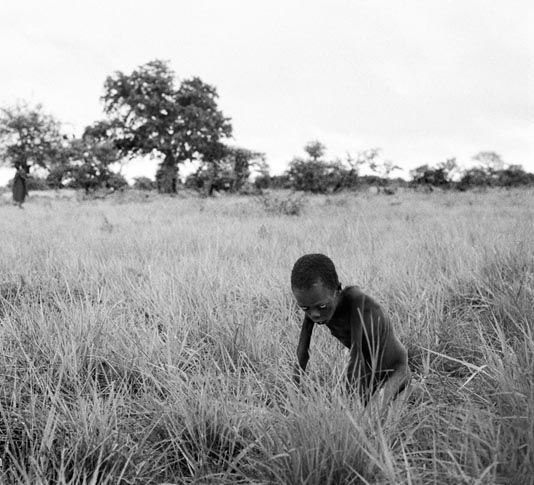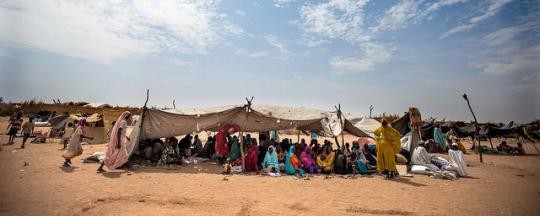“Obama’s Sudan Legacy: Justice and Restitution for the People of Sudan,” The Huffington Post, September 2015 | http://www.huffingtonpost.com/eric-reeves/obamas-sudan-legacy-justi_b_8129486.html
by Eric Reeves
The Obama administration has, by all measures, done a very poor job of responding to the complex challenges in Sudan and South Sudan, and to the vast humanitarian crises exacerbated by short-sighted policy decisions. Even so, a remarkable opportunity has presented itself, one that allows the administration to create an important legacy for the two Sudans, one that would endure long after the end of President Obama’s term in office.
In June 2014 the Department of Justice convicted BNP Paribas (BNPP), the French banking giant, of criminal financial activities benefiting the Khartoum regime in Sudan. This regime has for the past twenty-five years tyrannized and waged war against its own people. As a consequence of its criminal actions, BNPPP was obliged under the terms of the plea agreement to pay a forfeiture and fine that together totaled approximately $9 billion. Predictably, with so much money on the table, various U.S. entities were scrambling for a piece of this vast pie.
But from the pie, DOJ committed explicitly to providing restitution to those who were “directly and proximately harmed” by the actions of BNPP (the language is that of presiding District Court Judge Lorna Schofield). No one fits the most obvious sense of this phrase better than the people of greater Sudan.
In referring to “harm” I mean to refer not only to “harm” suffered by Darfuris, but suffered also by the 370,000 Darfuri refugees in eastern Chad; by the vast numbers of people who are suffering and dying in South Kordofan and Blue Nile—and yet who are relentlessly denied relief aid by the Khartoum regime; by the communities of eastern Sudan, who have also been victims of the ruthless, militarized security state the regime has created—most austerely over the past four years. So, too, the people of Nubia in the far north, many of whom have been displaced by ill-considered dam schemes on the Nile River.
Importantly, there must be a considered response to the needs of the people of South Sudan, who endured many of Khartoum’s worst military crimes committed in the years 2002 – 2008, the window of time for Sudan created by the Department of Justice “statement of facts” (South Sudan did not become an independent nation until July 2011). The Nuer communities of Unity State suffered particularly brutal attacks and civilian clearances in the oil regions.
Also conspicuous in this context, if rarely reported, is the terrible harm done to the people of the Abyei region. Militarily denied their right to a self-determination referendum by the Khartoum regime, the indigenous Dinka Ngok are daily moved further and further into Khartoum’s expansive death grip. In flagrant violation of the 2005 Comprehensive Peace Agreement, containing an “Abyei Protocol,” Khartoum effectively annexed Abyei, with no meaningful protest from any international actor of consequence—none.
Abyei town ablaze after Khartoum’s military seizure of the region in May 2011
Given the extraordinary levels of destruction, murder, displacement, land appropriation, as well as widespread and ongoing suffering and deprivation–and the acute lack of adequate humanitarian resources–it seems morally imperative that the Obama administration’s Department of Justice view the BNPP restitution provisions as justifying the urgent provision of relief aid in greater Sudan. Although not clearly guided by legal precedent in this unprecedented criminal forfeiture case involving BNPP, the Department of Justice—including Attorney General Loretta Lynch—certainly has the power and discretion to expedite forfeiture funds that have been designated for “restitution.”
So far, no money from the BNPP settlement has gone to the Sudanese communities harmed by BNPP’s illegal financial support of Khartoum, although the Department of Justice is considering a proposal to do so. DOJ should strongly support the proposal and move ahead expeditiously; the people of Darfur and other displaced Sudanese communities are dying now:
Mortality rates owing to severe malnutrition among children in western Jebel Marra, Central Darfur, are rising rapidly. Nierteti Hospital is crowded with young patients from the areas of Guldo, Tor, and Golo, an activist told Radio Dabanga. “From 18 July until Thursday more than 15 children at Nierteti hospital died as a result of undernourishment,” he said. “Seven of them died last week … (Radio Dabanga, September 9, 2015)
Sudanese child dying alone of starvation in previous famine in Sudan
We know also that the UN’s High Commission for Refugees has warned that in 2016 there will be no funding for the 370,000 Darfuri refugees living in eastern Chad; and relief organizations are withdrawing from Darfur for lack of funding, leaving gaping holes in the humanitarian infrastructure created over the past eleven years.
So what impedes the decision to release at least part of the restitution funds destined for Sudan, which suffered from 72% ($6.4 billion) of the criminal activity on BNPP’s part–financial activity that supported the Khartoum regime while it waged war on its own people?
• The humanitarian need is overwhelmingly clear;
• The predominant role of the Khartoum regime in benefitting from BNPP’s criminal financial activities is beyond question—at the very least, 72 percent of those “directly and proximately harmed” by the action of BNPP. (Cuba, also part of the BNPP case, is unlikely to produce credible and comparable claims of harm, given conditions prevailing in the Caribbean nation during the time window created by DOJ’s statement of facts;Iran was the beneficiary of only a very small percentage of illegal financial activity);
• The BNPP forfeiture funds are in the hands of the Treasury Department, which awaits instructions on how to disburse the $3.84 billion designated in the sentencing phase of the criminal trial (May 2015).
Treasury has received no such instructions, but President Obama could direct Attorney General Lynch to provide the means for rapid, highly targeted, supplementary humanitarian assistance—by means of the U.S. Agency for International Development–to people in desperate need in Sudan, South Sudan, and refugees camps in other countries to which many hundreds of thousands of Sudanese have been driven.
Internal displacement has also been massive in Sudan: in Darfur alone more than 2.5 million people are internally displaced, and increasingly at risk of attack by Khartoum’s militia forces, particularly the Rapid Support Forces.
Some of the Darfuris newly displaced this year in South Darfur
More than 1 million children under the age of five are severely or acutely malnourished. And at the same time funding shortfalls are biting deeply: less than 40 percent of what is needed for humanitarian purposes in Sudan and South has been provided by the international community. The UN very recently reported (September 6) that:
[T]he UN Humanitarian Air Service (UNHAS) has a funding shortfall of $9.9 million which, if not addressed, will force the agency to close down air services at the end of the month. UNHAS passenger and cargo services are critical to facilitating humanitarian work in Sudan especially in remote locations where, due to lack of infrastructure, insecurity and lack of commercial alternatives.
Now is the time, Mr. President, for you to make your mark–at a critical juncture in Sudanese history; a detailed plan already exists, with widespread Sudanese support (http://sudancommunitycompensation.org/).
Your legacy, if actions are prompt, will be defined not merely by the diplomatic errors of the past but by your determination–now that you have the means–to deliver a partial but important form of justice and compensation to those communities of greater Sudan that have been harmed in terrible ways–ways materially assisted by the criminal actions of BNP Paribas in its gross abuses of the American financial system.
*******
To date, approximately 100 organizations, advocacy groups, and prominent individuals from around the world have signed on to support the Sudan Community Compensation Program; more are signing on daily:
Act for Sudan, Martina Knee, Co-Founder, San Francisco, CA, USA
African Centre for Justice and Peace Studies, New York, NY, USA
Ahmed H. Adam, Visiting Fellow, Institute for African Development (IAD), Cornell University, Ithaca, NY, USA
African Freedom Coalition, Al Sutton M.D., President, New York, NY, USA
African Soul, American Heart, Debra Dawson, President, Fargo, ND, USA
Human Rights Organization-Sudan (HRO-S), Ayman Adel Amin, Stockholm, Sweden
Kalthoum Fadlalla Mohamed Ali, Human Rights Activist, South Khartoum, Sudan
Alliance for a Just Society, William Daley, Legislative Director, Seattle, WA, USA
American Friends of the Episcopal Church of South Sudan and Sudan, Richard Parkins, Executive Director, Alexandria, VA, USA
American Friends Service Committee Wage Peace, Stephen McNeil, Director, San Francisco, CA, USA
Amnesty 133, Refugee Action Team, Dr. Eric Aronson, Somerville, MA, USA
Arab Coalition for Sudan, Wadah Tabir, General Coordinator, Cairo, Egypt
Arry Organization for Human Rights, Osman Naway, General Director, Kansas City, MO, USA
Blue Nile Association For Peace and Development, Abdalla Babikir, Washington, DC, USA
Brooklyn Coalition for Darfur & Marginalized Sudan, Laura Limuli, Coordinator, Brooklyn, NY, USA
Dr. Tom Catena, Medical Director, Mother of Mercy Hospital, Nuba Mountains, Sudan
Christian Solidarity International-USA, The Rev. Heidi McGinness, Director of Outreach, Denver, CO, USA
Collectif Urgence Darfour, Dr. Jacky Mamou, Chairman, Paris, France
Colorado Coalition for Genocide Awareness and Action, Roz Duman, Founder and Director, Denver, CO, USA
Congolese Genocide Awareness, Anthony Kasongo, Executive Director, Everett, MA, USA
The Baroness Caroline Cox, Chief Executive, Humanitarian Aid Relief Trust, and Member, House of Lords, Parliament of the United Kingdom, London, UK
Ted Dagne, Director, African Refugees and Victims Relief Fund, Washington Metro Area, USA
Darfur Action Group of South Carolina, Richard Sribnick, MD, Chairman, Columbia, SC, USA
Darfur and Beyond, Cory Williams, Co-Founder, Phoenix, AZ, USA
Darfur Bar Association, Abdelrahman Gasim, External Relations Secretary, Sudan
Darfur Human Rights Organization of the USA, Abdelgabar Adam, President and Founder, Philadelphia, PA, USA
Darfur Interfaith Network, Martha Boshnick, Co-Chair, Washington, DC, USA
Darfur People’s Association of New York, Mohamed Haroun Ebead, President, Brooklyn, NY, USA
Darfur Relief and Documentation Centre, Abdelbagi Jibril, Vice-President, Geneva, Switzerland
Dear Sudan, Love Marin, Gerri Miller, Coordinator, Tiburon, California USA
Daniel Deng, Director, Kush Inc., Washington Metro Area, USA
Claudia Dumas, President &CEO, Transparency International-USA
Mohammed Eisa, Researcher, RFK Human Rights Laureate 2007, Cambridge, MA, USA
Aicha Elbasri, former Spokesperson for the African Union-United Nations Mission in Darfur
Genocide No More–Save Darfur, Marv Steinberg, Coordinator, Redding, CA, USA
Genocide Watch, Greg Stanton, President, Research Professor, School for Conflict Analysis and Resolution, George Mason University, Arlington, VA, USA
Georgia Coalition to Prevent Genocide, Melanie Nelkin, Chair, Atlanta, GA, USA
Global Financial Integrity, Heather A. Lowe, Legal Counsel and Director of Government Affairs, Washington, DC, USA
John Hagan, John D. MacArthur Professor, Northwestern University, Evanston, IL, USA
Human Rights and Advocacy Network for Democracy (HAND), Abdalmageed S. Haroun, Brooklyn, NY, USA
Humanity Is Us, Kimberly Hollingsworth, Founder and President, New York, NY, USA
Sharon Hutchinson, Member of the Civilian Protection Monitoring Team, South Sudan (2002 – 2003), Madison, WI, USA
Institute on Religion and Democracy, Mark Tooley, President, Washington, DC, USA
International Justice Project, Monica Feltz, Esq., LL.M., Executive Director, Newark, NJ, USA
Investors Against Genocide, Eric Cohen, Chairperson, Boston, MA, USA
Iowa Center for Genocide Prevention, Kristen Anderson, Founder, Des Moines, IA, USA
Mohammadain Ishag, Radio Journalist and Human Rights Activist, Cardiff, UK
Afeif Ismail, Poet, Playwright and Human Rights Activist, 2008 Australian National Playwrights’ Conference (ANPC) Bursary award winner, Perth, Australia
Jews Against Genocide, Eileen Weiss, Co-Founder, New York, NY, USA
Joining Our Voices, Slater Armstrong, Founder/Director, Baton Rouge, LA, USA
Mukesh Kapila (CBE), Former Head of the UN in Sudan, Geneva, Switzerland
Kurdistan Without Genocide, Ali Mahmud, Director, Erbil, Iraq
Long Island Darfur Action Group, Nancy Walsh, Coordinator, Farmingdale, NY, USA
The MagkaSama Project, Max Dana, Founder, Paris, France
Massachusetts Coalition for Darfur, William Rosenfeld, Director, Boston, MA, USA
My Sister’s Keeper, Sarah Cleto Rial, Program Director, Boston, MA, USA
Never Again Coalition, Lauren Fortgang, Co-Chair, Portland, OR, USA
New York Coalition for Sudan, Sharon Silber, Co-Director, New York, NY, USA
New York Darfur Vigil Group, Helga Moor, Coordinator, New York, NY, USA
Northwest Bronx For Change, Gene Binder, Steering Committee, Bronx, NY, USA
Nuba Christian Family Mission, James Spencer Flournoy, Director, Denver, CO, USA
Nuba Mountains Advocacy Group USA, Gogadi Amoga, Chair, Batavia, OH, USA
Nuba Mountain Peace Coalition, Robert Cooper, Dallas, TX, USA
Nubia Project, Nuraddin Abdulmannan, President, Washington, DC, USA
OMNI Center for Peace, Justice & Ecology, Gladys Tiffany, Director, Fayetteville, AR, USA
Operation Broken Silence, Mark C. Hackett, Executive Director, Memphis, TN, USA
Our Humanity in the Balance, Terry Nickelson, Executive Director, Brevard, NC, USA
People4Sudan, Valerie Delacretaz, Coordinator, Geneva, Switzerland
Pittsburgh Darfur Emergency Coalition, David Rosenberg, Coordinator, Pittsburgh, PA, USA
Eric Reeves, Sudan Researcher, Author of Compromising with Evil: An Archival History of Greater Sudan, 2007 – 2012 (2012), Northampton, MA, USA
Religious Liberty Program and Church Alliance for a New Sudan, Institute on Religion and Democracy, Faith J. H. McDonnell, Director, Washington, DC, USA
Ahmed A. Saeed, PhD., Humanitarian Aid Worker, Southern Kordofan/Nuba Mountains and Blue Nile States, Sudan
Hawa Abdalla Salih, Human Rights and Women’s Rights Activist, Recipient, 2012 U.S. Secretary of State’s International Women of Courage Award, Philadelphia, PA, USA
San Francisco Bay Area Darfur Coalition, Mohamed Suleiman, President, San Francisco, CA, USA
Prof. Robert Skloot (emeritus), University of Wisconsin-Madison, Madison, WI, USA
Stop Genocide Now, Katie-Jay Scott, Director and Founder, Redondo Beach, CA, USA
Sudan Rowan, Inc., Ngor Kur Mayol, President and Co-founder, Atlanta, GA, USA
Sudanese American Democratic Alliance, Abdelsalam Hamid, Saint Paul, MN, USA
Rebecca Tinsley, Author of When the Stars Fall to Earth, A Novel of Africa (LandMarc Press, 2011), and Founder, Waging Peace, London, UK
Dr. Samuel Totten, Professor Emeritus, University of Arkansas, co-editor of Conflict in the Nuba Mountains: From Genocide by Attrition to the Contemporary Crisis (Routledge, 2015), Fayetteville, AR, USA
Trinity South Sudan Ministry, Bill Andress, Lexington, SC, USA
Unite for Darfur Organization, Bahar Arabie, CEO, Gaithersburg, MD, USA
United Sudanese and South Sudanese Communities Association (USASSCA), Henry Lejukole, Chairman, Des Moines, IA, USA
Until We Return Vocal Group, Nazik Osman, Singer and Human Rights Activist, Perth, Australia
Use Your Voice to Stop Genocide RI, Sandra Hammel, Director, Portsmouth, RI, USA
Voices for Sudan, Jimmy Mulla, President and Co-Founder, Washington, DC, USA
Waging Peace, Olivia Warham MBE, Director, London, UK
John H. Weiss, Founder, Caceres-Neuffer Genocide Action Group, Associate Professor of History, Cornell University, Ithaca, NY, USA
Rev. Gloria E. White-Hammond, M.D., Co-Pastor of Bethel AME Church and Executive Director of My Sister’s Keeper, Boston, MA, USA
Women Who Grow, Diar Rehabilitation Development Association, Karak Mayik Denyok, Founder and President, Denver, CO, USA
World Peace and Reconciliation, Adeeb Yousif, President, Arlington, VA, USA
World Without Genocide at William Mitchell College of Law, Ellen J. Kennedy, Ph.D., Executive Director, St. Paul, MN, USA
Dr. Abdin Zeinelabdin, Human Rights Activist and Former Secretary General of the University of Khartoum Staff Association, Waterloo, Ontario, Canada
[Eric Reeves, a professor at Smith College, has published extensively on Sudan, nationally and internationally, for the past sixteen years. He is author of Compromising with Evil: An archival history of greater Sudan, 2007 – 2012 (September 2012)]




